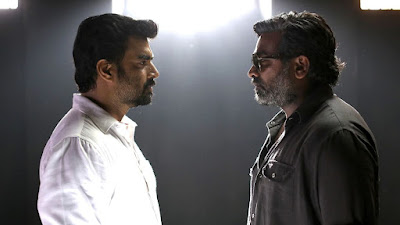An altogether self-reflexive affair, then - an exercise in long-form, big-picture yarnspinning that also encompasses a fair amount of running, jumping and those tremendous open-handed slaps that are the signature move of the Indian action hero. The discourse starts in the opening sequence, Vikram insisting one hood tell him a joke at gunpoint; it develops - festers, maybe - back at HQ, the cops swapping legends that shore up what would otherwise be fairly tattered reputations; in the interview-room scenes, it explodes into a full-on battle of wills and philosophies. What Pushkar-Gayatri are themselves interrogating is what we want from stories such as these, and what the men's self-glorifying tales tell us about the tellers. At its most radical, Vikram Vedha gestures towards a procedural that is above anything else rhetorical, where talk replaces action - or talk becomes a kind of action in itself, the villain tying the hero up in knots with his tongue and giving everybody the runaround. More conventional forms of thinking hold sway elsewhere. It's fun to see Srinath's lawyer getting drawn into these cat-and-mouse negotiations (as Vedha's counsel, no less, in a further slap to her man's ego), but this broadly remains a boys' town, the leads making light work of this chatter while suggesting the growth that comes from reflecting on the words of others; it's an actioner where the hero and villain are chastened by one another.
The final act struck me as disappointingly rote, almost like something a money-grubbing, risk-averse, trailer-conscious producer would have insisted on filming: a shootout in an abandoned factory, where the conversation is finally halted, loose ends are tied up at length, and nothing really gets as subverted as it is in the first two-thirds. It's ultimately a playful film rather than an especially deep one, an entertainment above all else. But it is entertaining for the most part, scouting out characterful locations that prove very nearly as lived-in as the premise and therein unlocking unexpected lines of entry and exit for each scene; Pushkar-Gayatri also pay a high level of attention to exactly that character development and plot detail now missing from a lot of high-profile Bollywood (and Hollywood) scripts. You can tell someone behind the camera has spent late nights getting all the structural nuts-and-bolts in place, and making sure everything else lines up as it should. It proved as much a statement of creative intent for its makers as The Usual Suspects (another touchstone of some sort) was for Christopher McQuarrie: within five years, this pair would be running their own Amazon streaming show (Suzhal: The Vortex) and remaking Vikram Vedha in Hindi with major Bollywood stars. You can still go a long way with the gift of the gab.
Vikram Vedha is now streaming on Prime Video.

No comments:
Post a Comment